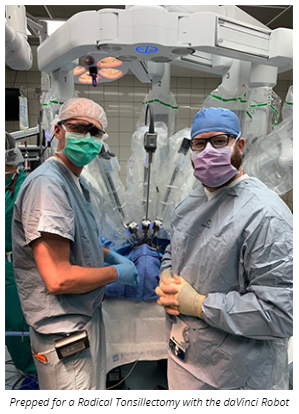Exploring the Field of Otolaryngology: What to Anticipate When You Seek Advice From an ENT
Otolaryngology, generally described as ENT, incorporates the diagnosis and treatment of ear, throat, and nose problems. For those experiencing related concerns, seeking advice from an ENT specialist can provide clearness and relief. Recognizing what to anticipate throughout such examinations is important for efficient interaction and treatment. This introduction will certainly describe crucial facets of the ENT experience, consisting of typical factors for sees and the procedures included in medical diagnosis and therapy.

Comprehending Otolaryngology: A Review
Otolaryngology, typically described as ENT (Ear, throat, and nose) medicine, is a specialized branch of medicine that focuses on the diagnosis and treatment of problems impacting these critical areas of the body. This area includes a variety of conditions, consisting of those pertaining to hearing, balance, respiratory system function, and speech. Otolaryngologists are educated to handle both clinical and surgical therapies, utilizing innovative methods and technologies. Their know-how expands past standard conditions, dealing with concerns such as allergies, sinus infections, and hearing loss. Additionally, they play a crucial function in the monitoring of head and neck cancers, providing comprehensive care tailored to private person demands. On the whole, otolaryngology continues to be important for maintaining health and lifestyle in affected people.
Usual Reasons to See an ENT Expert
Numerous individuals seek the know-how of an ENT expert for a selection of factors, reflecting the varied nature of problems that affect the nose, ear, and throat. Typical problems consist of chronic sinusitis, which usually brings about consistent nasal blockage and facial pain. Allergic reactions and their associated signs, such as itching and sneezing, also prompt brows through to these specialists (ENT Doctor). Hearing loss, whether sudden or gradual, is another significant reason for examination. Furthermore, people might look for assessment for throat conditions, consisting of persistent hoarseness or ingesting difficulties. Sleep apnea, identified by disrupted breathing throughout sleep, is regularly dealt with by ENT experts also. Each of these conditions highlights the value of specialized care in handling intricate ENT-related wellness issues
Planning for Your ENT Consultation
When planning for an ENT appointment, it is necessary to gather pertinent details and consider any particular worries. Patients should compile a comprehensive clinical history, consisting of previous ear, nose, or throat issues, surgical treatments, and current medicines. Documenting signs-- such as extent, period, and frequency-- can supply useful insights for the ENT expert. Furthermore, people must prepare a checklist of questions they want to ask, ensuring that all issues are addressed throughout the go to. Bringing along any type of appropriate clinical documents or examination outcomes can better assist the ENT in understanding the person's problem. Individuals ought to verify their appointment information, consisting of place, date, and time, to minimize any kind of last-minute complication. Proper prep work can enhance the performance of the appointment and result in much better outcomes.
What to Anticipate During the Assessment
As the appointment starts, the individual can expect to participate in a thorough conversation with the ENT professional about their signs and symptoms and medical background. The specialist will ask about the period, regularity, and severity of symptoms such as hearing loss, nasal blockage, or sore throat. In addition, the patient's previous medical conditions, medications, and any kind of appropriate family members background will certainly be assessed, helping the expert in creating a full understanding of the individual's health and wellness. The ENT may likewise ask about lifestyle variables, such as exposure to toxic irritants or allergens. This open dialogue establishes a structure for the assessment, making sure that the individual's issues are attended to and setting the stage for any essential evaluations or referrals review for treatment.
Analysis Tests and Treatments in Otolaryngology
A variety of analysis examinations and treatments are vital in otolaryngology to precisely evaluate and diagnose conditions influencing the nose, throat, and ear. Typical tests consist of audiometry, which measures hearing function, and tympanometry, analyzing center ear stress. Nasal endoscopy permits visualization of the nasal flows and sinuses, while laryngoscopy checks out the throat and vocal cables. Imaging methods, such as CT scans and MRIs, supply in-depth views of head and neck structures. Allergic reaction screening may also be performed to recognize triggers for sinus or breathing concerns. These analysis devices allow ENT experts to establish an extensive understanding of people' problems, guaranteeing tailored and effective administration strategies. Appropriate diagnosis is important for effective therapy outcomes in otolaryngology.
Therapy Choices Provided by ENT Specialists
ENT professionals offer a range of therapy choices tailored to resolve particular conditions influencing the nose, throat, and ear. These therapies range d hearing from traditional strategies, such as drug and way of living alterations, to more intrusive procedures. Allergic reactions may be taken care of with antihistamines or immunotherapy, while chronic sinus problems may call for nasal corticosteroids or sinus surgical treatment. For hearing loss, ENT specialists typically advise listening device or surgical treatments like cochlear implants. In situations of throat problems, choices can consist of speech therapy or surgeries to remove obstructions. Additionally, they may offer support for managing sleep apnea, including using CPAP devices or medical interventions. Overall, the objective is to improve individuals' high quality of life with individualized care and effective treatment approaches.
When to Look For Follow-Up Treatment With an ENT
When to seek follow-up care with an ENT expert is essential for taking care of continuous signs or complications connected to throat, ear, and nose conditions, acknowledging. People should think about arranging a follow-up visit if signs and symptoms persist despite first therapy, such as chronic ear pain, nasal blockage, or throat pain. Modifications in hearing, equilibrium issues, or unusual nasal discharge might also warrant more evaluation. Furthermore, if a client experiences adverse effects from suggested medications or has actually undergone a procedure, follow-up care is crucial to monitor healing and resolve any type of concerns. Timely consultations can ensure efficient administration of problems, avoid prospective complications, and supply tranquility of mind concerning one's health. Looking for follow-up treatment advertises positive health monitoring in otolaryngology.
Often Asked Inquiries

What Certifications Should I Seek in an ENT Expert?
When looking for an ENT professional, one should try to find board qualification, pertinent experience, and strong client evaluations. Additionally, reliable communication skills and a thoughtful approach can considerably boost the total treatment experience.
Just how Do I Select the Right ENT for My Demands?
Picking the appropriate ENT specialist involves reviewing their credentials, experience, and client Related Site reviews (Otorrinolaringologia). It is important to ponder their communication design and strategy to therapy, ensuring they straighten with the person's details health needs and choices
Exist Any Kind Of Dangers Related To ENT Procedures?
The risks linked with ENT treatments might consist of infection, bleeding, anesthetic problems, and possible damage to surrounding frameworks. Individuals should discuss these dangers with their physician to comprehend specific issues and assurance informed choices.
Exactly How Can I Handle Anxiety Prior To My ENT Visit?
To manage anxiety before a consultation, individuals can practice deep breathing workouts, envision positive results, prepare questions ahead of time, and seek support from good friends or family, cultivating a feeling of reassurance and peace.
What Should I Do if I Experience Adverse Effects From Treatment?
The person must quickly report them to their health care copyright if side results from therapy occur. Adjustments to therapy or extra treatments might be needed to guarantee security and efficiency in managing their condition - Voice. As the consultation starts, the client can expect to involve in an extensive conversation with the ENT professional regarding their symptoms and clinical history. These diagnostic tools allow ENT specialists to develop a thorough understanding of individuals' conditions, guaranteeing tailored and efficient management plans. ENT experts use a variety of therapy alternatives customized to address specific conditions impacting the ear, nose, and throat. When looking for an ENT specialist, one ought to look for board accreditation, pertinent experience, and solid patient testimonials. Picking the ideal ENT specialist entails evaluating their qualifications, experience, and individual reviews
Comments on “Why ENT Specialists Use Modern Tools to Treat Difficult Cases”